福州瑞芯微电子有限公司
密级状态:绝密( ) 秘密( ) 内部( ) 公开( √ )
[RK3188&3288_Android4.4&5.1-SDK]双屏双显
使用说明
(第一系统产品部)
文件状态:
当前版本:
V1.3
[ ] 正在修改
作 者:
SZC, SZY, ZY
[√] 正式发布
完成日期:
2016-11-08
审 核:
ZY, ZXZ
完成日期:
2016-11-16
福州瑞芯微电子有限公司
Fuzhou Rockchips Semiconductor Co . , Ltd
(版本所有,翻版必究)
�
福州瑞芯微电子有限公司
版 本 历 史
版本号
作者
修改日期
修改说明
备注
V1.0
SZC
2016-10-20
添加系统 API
V1.1
SZY
2016-10-21
添加补丁与配置
V1.2
V1.3
ZY
ZY
2016-11-07
整理格式,补充配置说明
2016-11-08
增加双屏触摸简单说明
�
福州瑞芯微电子有限公司
目目 录录
1 简介 ............................................................................................................. 2
2 系统 API ....................................................................................................... 2
2.1 ANDROID PRESENTATION ............................................................................... 2
2.1.1 API 介绍 ............................................................................................ 2
2.1.2
Presentation 示例 ............................................................................... 5
2.2 RK DUALSCREEN ........................................................................................ 8
2.2.1 API 介绍 ............................................................................................ 8
2.2.2 RockChip DualScreen 接口使用示例 ........................................................ 9
3 补丁与配置 ................................................................................................... 11
3.1 ANDROID .................................................................................................11
3.1.1 RK3288 Android 5.1 ..........................................................................11
3.1.2 RK3288 Android 4.4 ..........................................................................12
3.1.3 RK3188 Android 5.1 ..........................................................................12
3.1.4 RK3188 Android 4.4 ..........................................................................12
3.2 KERNEL DRIVER .........................................................................................12
3.2.1 RK3288 Android 5.1 ..........................................................................12
3.2.2 RK3288 Android 4.4 ..........................................................................14
4 双屏触摸 ..................................................................................................... 14
4.1 原理说明 .................................................................................................14
4.2 补丁 ......................................................................................................15
1
�
福州瑞芯微电子有限公司
1 简介
本文主要介绍了 RockChip(以下简称 RK) SDK 平台上支持的异显方案,包括系统 API、
补丁、内核配置方法等,适用于以下 SDK 平台:
RK3188 Android4.4
RK3188 Android5.1
RK3288 Android4.4
RK3288 Android5.1
2 系统 API
RK 双屏异显方案有两种方式:Android Presentation 和 RK dualscreen。Android
Presentation 是 Google 提供的双屏方案,实现了 View 级别的 VOP 派发,逻辑均在同一个 APP
上进行控制;RK dualscreen 则是实现了 APP 级别的 VOP 派发,异显的两部分分别是不同的 APP。
Presentation 比较适用于对自身需求进行深入定制的方案,RK dualscreen 在满足深入定制方
案下,也支持,快速集成多方 APP,进行功能整合。两者各有优缺点,也能够进行互补。
2.1
Android Presentation
2.1.1 API 介绍
官方 API 以及示例说明文档:
https://developer.android.com/reference/android/app/Presentation.html
Presentation 是 google 官方提供的一个特殊的 dialog 类型,用来将特定内容显示到其他非
主屏显示器上。它在创建时,需要绑定显示屏,并根据这个目标显示屏以及其大小来配置 context
和 resource。目前系统提供了两种方式来与目标显示屏进行绑定。
1. 通过 MediaRouter 接口获取并绑定:
2
�
福州瑞芯微电子有限公司
MediaRouter mediaRouter =(MediaRouter)
context.getSystemService(Context.MEDIA_ROUTER_SERVICE);
MediaRouter.RouteInfo route = mediaRouter.getSelectedRoute();
if(route !=null){
Display presentationDisplay = route.getPresentationDisplay();
if(presentationDisplay !=null){
Presentation presentation =newMyPresentation(context, presentationDisplay);
presentation.show();
}
}
2. 通过 DisplayManager 接口获取并绑定:
DisplayManager displayManager =(DisplayManager)
context.getSystemService(Context.DISPLAY_SERVICE);
Display[] presentationDisplays =
displayManager.getDisplays(DisplayManager.DISPLAY_CATEGORY_PRESENTATION);
if(presentationDisplays.length >0){
// If there is more than one suitable presentation display, then we could consider
// giving the user a choice. For this example, we simply choose the first display
// which is the one the system recommends as the preferred presentation display.
Display display = presentationDisplays[0];
Presentation presentation =new MyPresentation(context, presentationDisplay);
presentation.show();
}
MediaRouter 和 DisplayManager 接口不在此处详细介绍。
Presentation 的接口使用简单,功能明确,主要接口如下:
1. 构造接口
(1) Presentation(Context outerContext,Display display)
接口说明:
实例一个使用默认主题,绑定到目标 display 上的 Presentation 对象。
参数说明:
outerContext:application 的 context 对象;
display:要绑定的目标 display,可以通过上述介绍的 MediaRouter 和 DisplayManager
接口获取。
3
�
福州瑞芯微电子有限公司
(2) Presentation(Context outerContext, Display display, int theme)
接口说明:
实例一个使用特定主题,并绑定到目标 display 上的 Presentation 对象。
参数说明:
outerContext:application 的 context 对象;
display:要绑定的目标 display,可通过上述介绍的 MediaRouter 和 DisplayManager 接
口获取;
theme:窗口使用的主题资源。
2. 方法接口
(1) Display getDisplay()
接口说明:
获取当前 presentation 显示所在的目标屏。
(2) Resources getResources()
接口说明:
获取用于当前 presentation 的 Resources 对象。
(3) void onDisplayChanged()
接口说明:
当 presentation 绑定的 display 发生变化(如大小、方向等)时,系统会回调此接口,并且
系统将自动调用 cancel()接口,关闭此 presentation。
(4) void onDisplayRemoved()
接口说明:
当 presentation 绑定的 display 被移除时,系统会回调此接口,并在此之后,系统会自动调
用 cancel()接口,关闭此 presentation。
(5) void show()
接口说明:
4
�
福州瑞芯微电子有限公司
用 于 显 示 此 presentation , 如 果 显 示 设 备 无 法 找 到 , 调 用 此 接 口 , 将 抛 出
WindowManager.InvalidDisplayException 异常。
(6) void onStart()
接口说明:
当此 presentation 启动后,会调用此接口,类似 activity 的 onStart。
(7) void onStop()
接口说明:
当此 presentation 正在走 stop 流程时,将会调用到此接口,类似 activity 的 onStop。
2.1.2 Presentation 示例
谷歌官方提供了 ApiDemo,用来展示各个 API 的使用,presentation 在源码中的范例路径
为:
development/samples/ApiDemos/./src/com/example/android/apis/app/Presentation
Activity.java。
关键代码(红色字体)介绍如下:
1. 获取目标显示设备:
public void updateContents() {
clear();
String displayCategory = getDisplayCategory();
Display[] displays = mDisplayManager.getDisplays(displayCategory);
addAll(displays);
Log.d(TAG, "There are currently " + displays.length + " displays connected.");
for (Display display : displays) {
Log.d(TAG, "" + display);
}
}
private String getDisplayCategory() {
return mShowAllDisplaysCheckbox.isChecked() ? null :
DisplayManager.DISPLAY_CATEGORY_PRESENTATION;
}
通过 DisplayManager 接口获取 PRESENTATION 类型的显示设备,添加到队列当中并绑定
5
�
福州瑞芯微电子有限公司
到各个 View 当中。
2. 点击 CheckItem,创建 Presentation,并显示:
public void onCheckedChanged(CompoundButton buttonView, boolean isChecked) {
if (buttonView == mShowAllDisplaysCheckbox) {
// Show all displays checkbox was toggled.
mDisplayListAdapter.updateContents();
} else {
//Display item checkbox was toggled.
final Display display = (Display)buttonView.getTag();
if (isChecked) {
PresentationContents contents = new PresentationContents(getNextPhoto());
showPresentation(display, contents);
} else {
hidePresentation(display);
}
}
}
通过 View 的 setTag 绑定对象的方法,将 display 对象绑定到具体 View 当中,并在需要时,
通过 getTag 获取对应的 display 对象。
private void showPresentation(Display display, PresentationContents contents) {
final int displayId = display.getDisplayId();
if (mActivePresentations.get(displayId) != null) {
return;
}
Log.d(TAG, "Showing presentation photo #" + contents.photo + " on display #" + displayId +
".");
DemoPresentation presentation = new DemoPresentation(this, display, contents);
presentation.show();
presentation.setOnDismissListener(mOnDismissListener);
mActivePresentations.put(displayId, presentation);
}
在范例中自定义了一个 Presentation 类,此处通过调用自定义的 Presentation,并显式调
用 show 方法,将此 Presentation 显示到对应的 display 上。
此处的 PresentationContents 只是自定义了一个数据的封装方式,传给 Presentation,实
际使用当中,可以根据项目需要,或者通过其他方式给显示的数据即可,不需要也创建这类对象。
3. 自定义 Presentation 类:
6
�
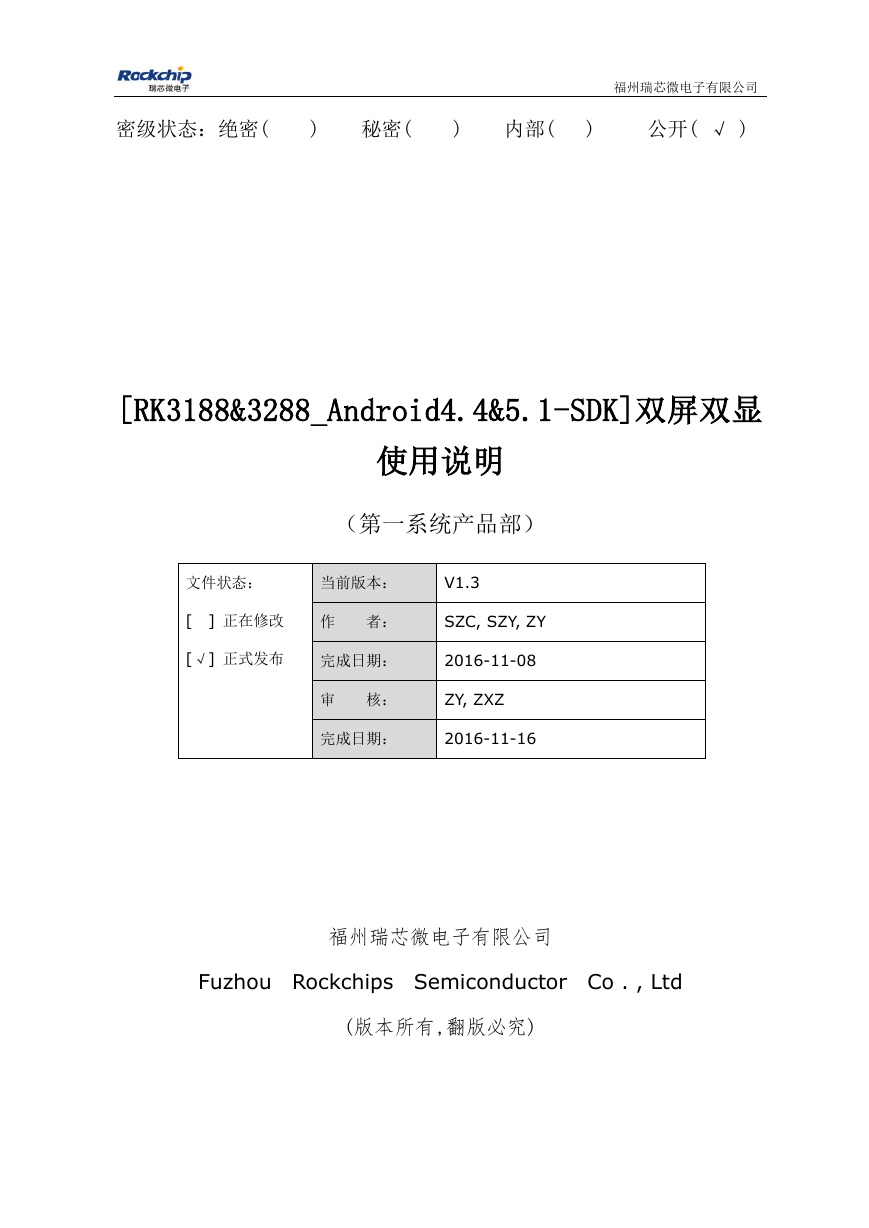
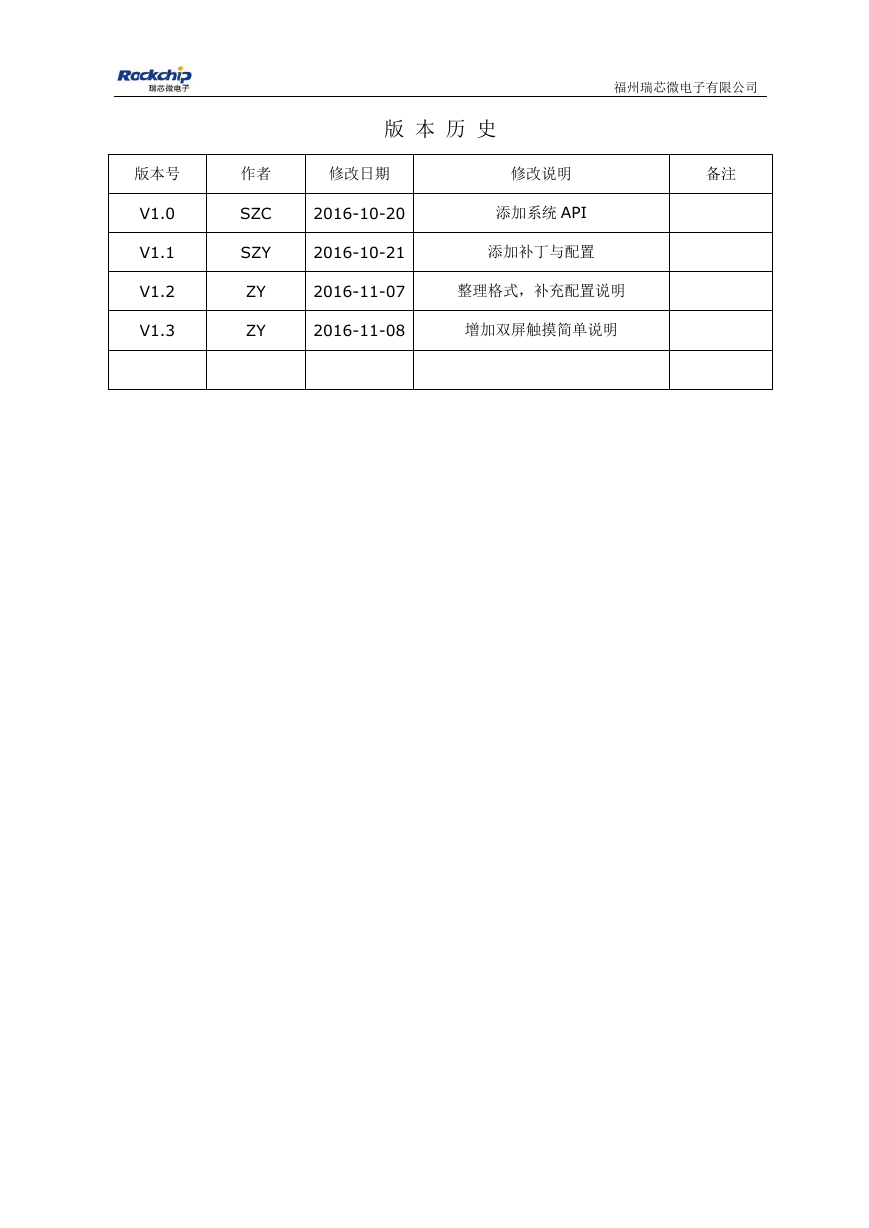
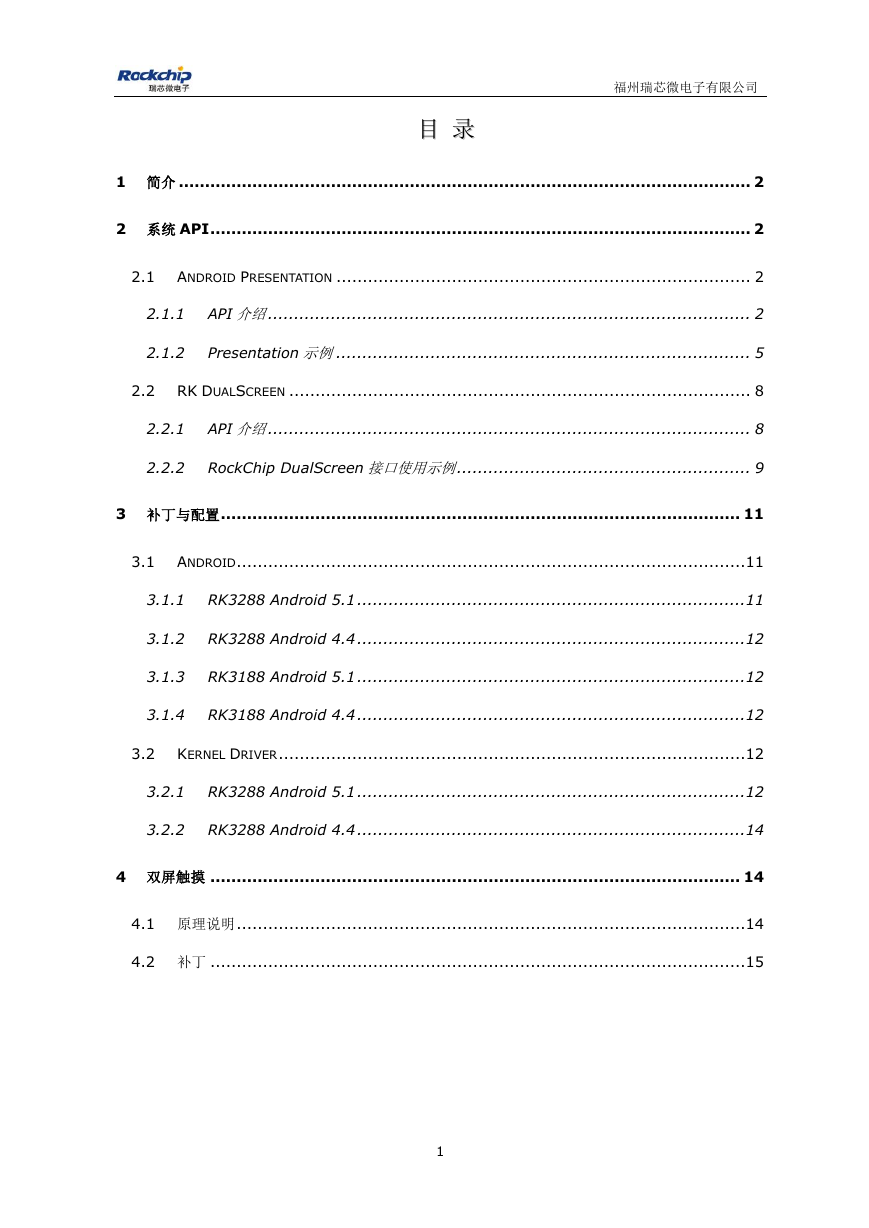
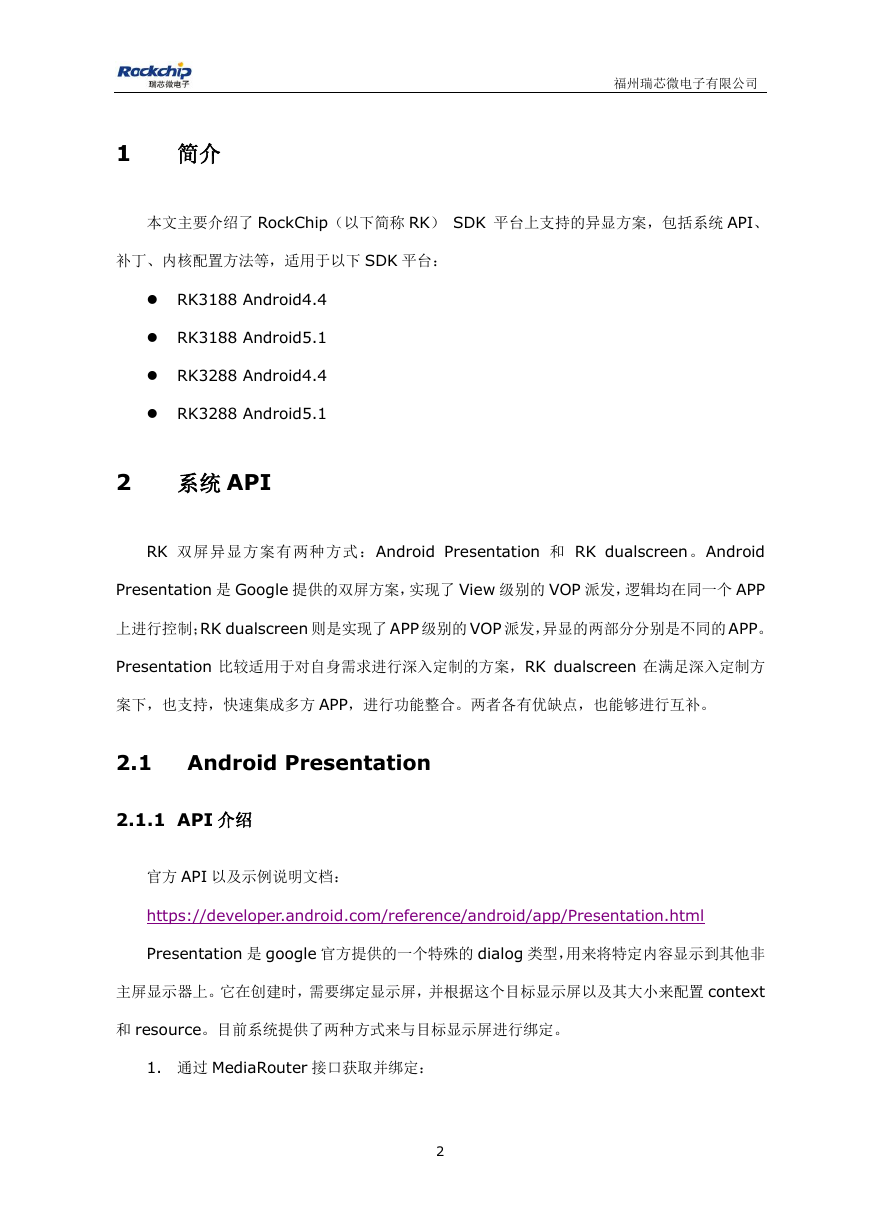
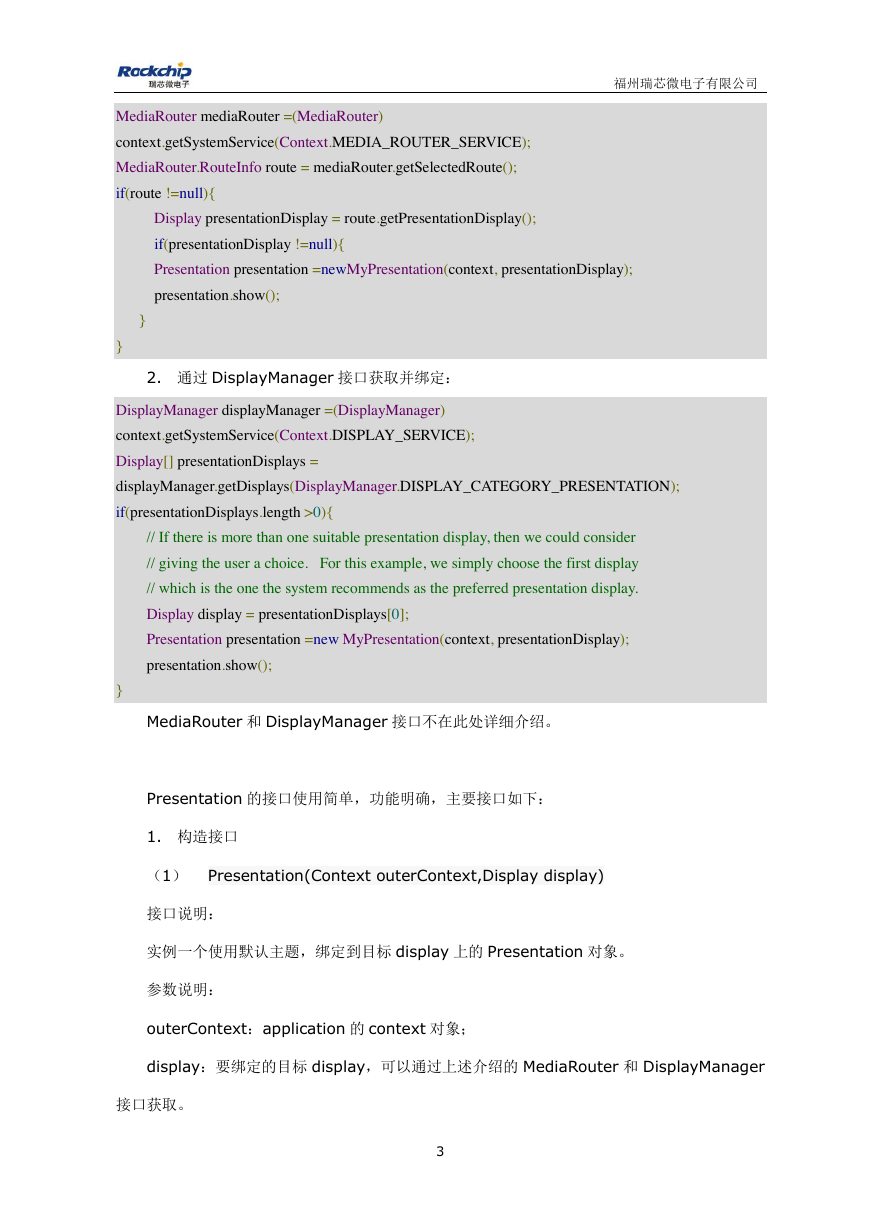
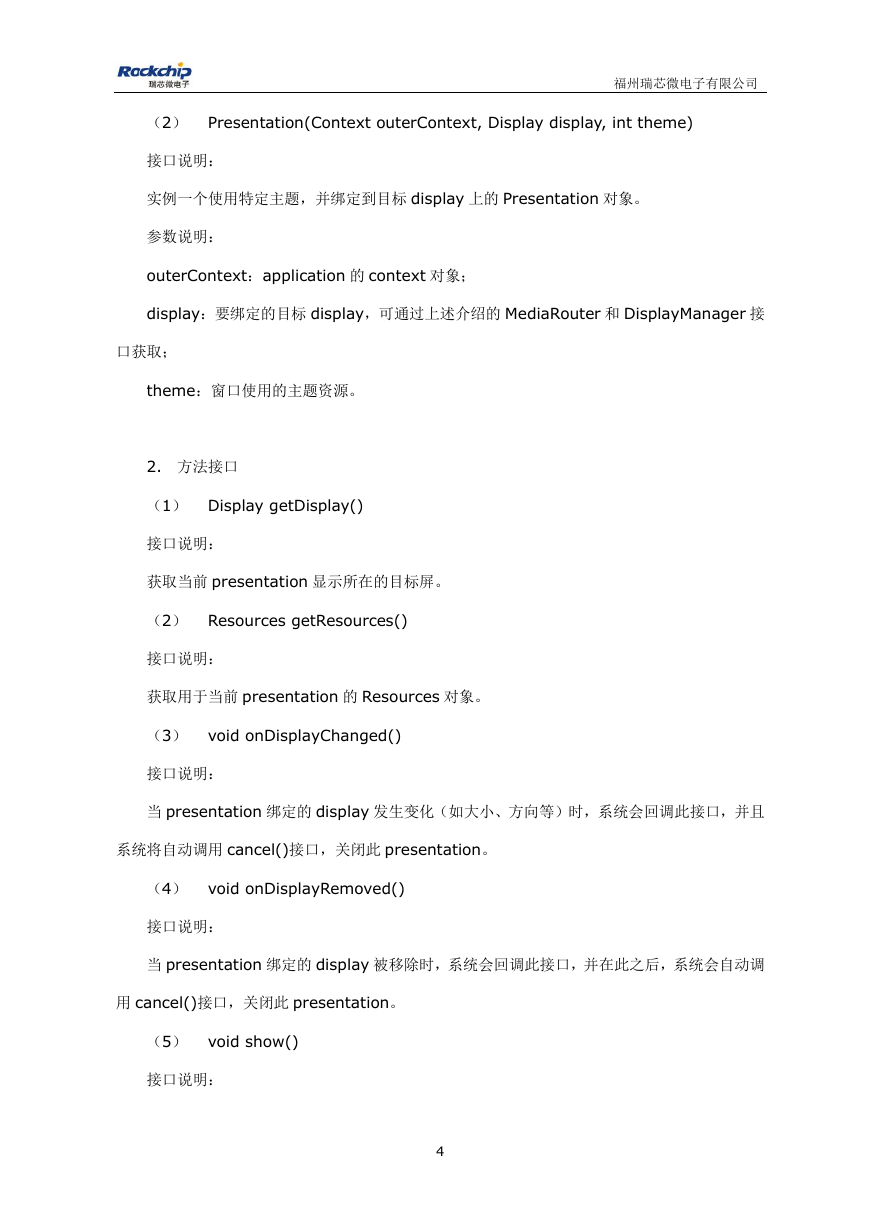
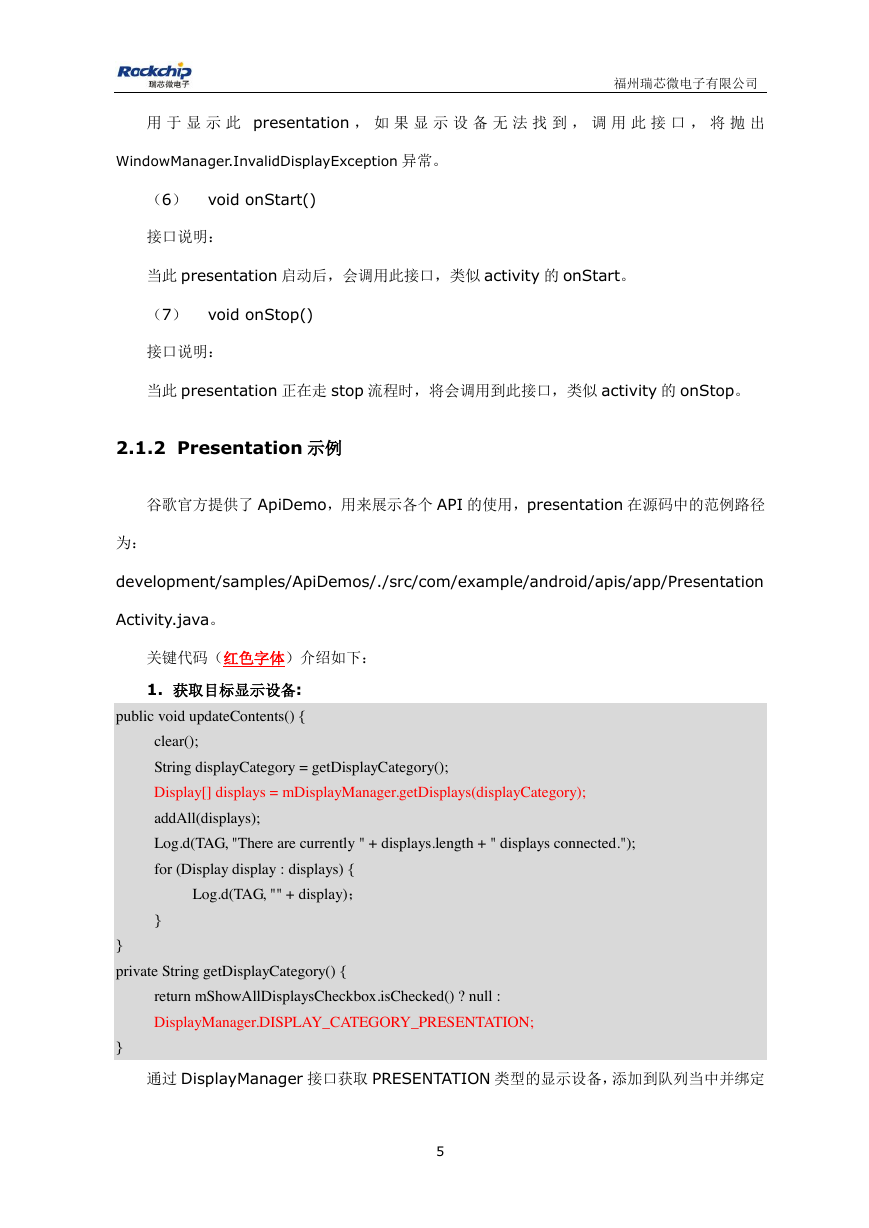
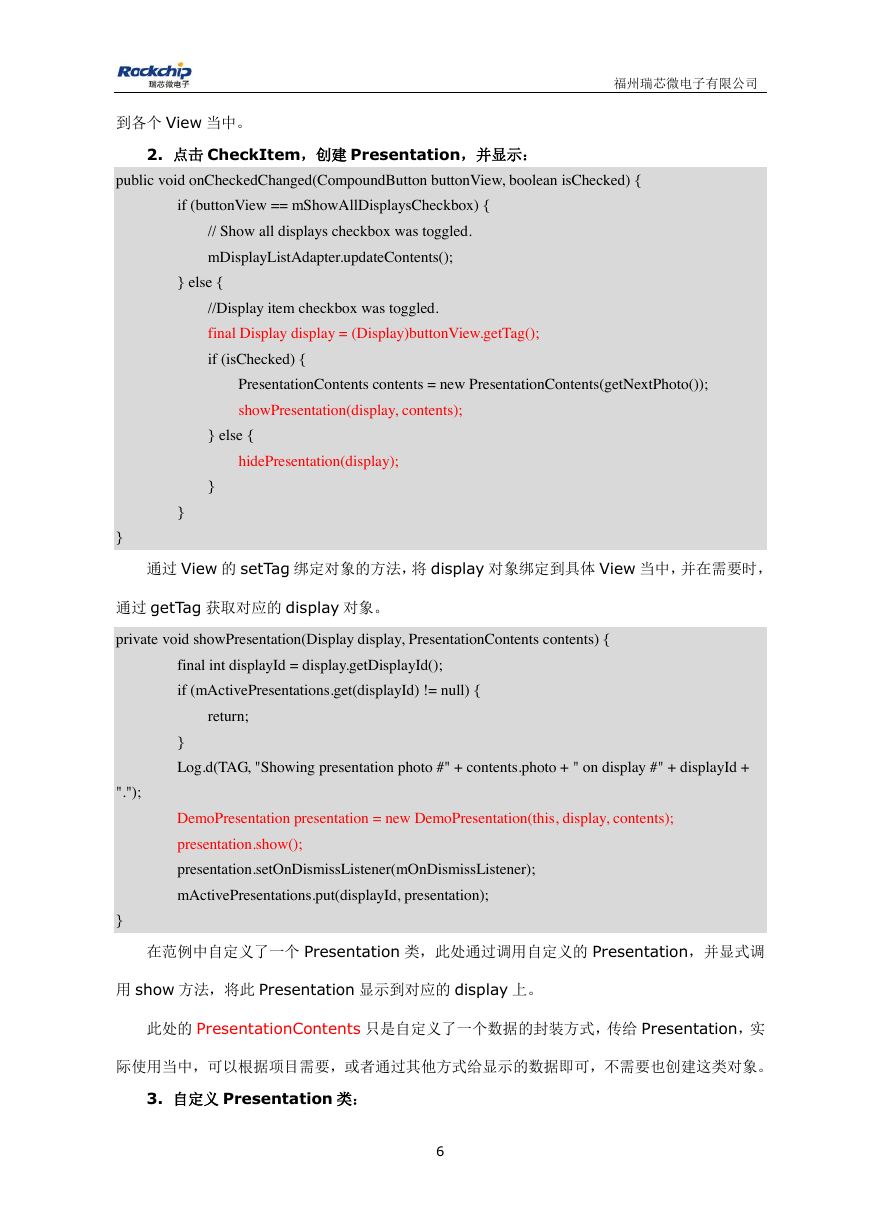








 2023年江西萍乡中考道德与法治真题及答案.doc
2023年江西萍乡中考道德与法治真题及答案.doc 2012年重庆南川中考生物真题及答案.doc
2012年重庆南川中考生物真题及答案.doc 2013年江西师范大学地理学综合及文艺理论基础考研真题.doc
2013年江西师范大学地理学综合及文艺理论基础考研真题.doc 2020年四川甘孜小升初语文真题及答案I卷.doc
2020年四川甘孜小升初语文真题及答案I卷.doc 2020年注册岩土工程师专业基础考试真题及答案.doc
2020年注册岩土工程师专业基础考试真题及答案.doc 2023-2024学年福建省厦门市九年级上学期数学月考试题及答案.doc
2023-2024学年福建省厦门市九年级上学期数学月考试题及答案.doc 2021-2022学年辽宁省沈阳市大东区九年级上学期语文期末试题及答案.doc
2021-2022学年辽宁省沈阳市大东区九年级上学期语文期末试题及答案.doc 2022-2023学年北京东城区初三第一学期物理期末试卷及答案.doc
2022-2023学年北京东城区初三第一学期物理期末试卷及答案.doc 2018上半年江西教师资格初中地理学科知识与教学能力真题及答案.doc
2018上半年江西教师资格初中地理学科知识与教学能力真题及答案.doc 2012年河北国家公务员申论考试真题及答案-省级.doc
2012年河北国家公务员申论考试真题及答案-省级.doc 2020-2021学年江苏省扬州市江都区邵樊片九年级上学期数学第一次质量检测试题及答案.doc
2020-2021学年江苏省扬州市江都区邵樊片九年级上学期数学第一次质量检测试题及答案.doc 2022下半年黑龙江教师资格证中学综合素质真题及答案.doc
2022下半年黑龙江教师资格证中学综合素质真题及答案.doc